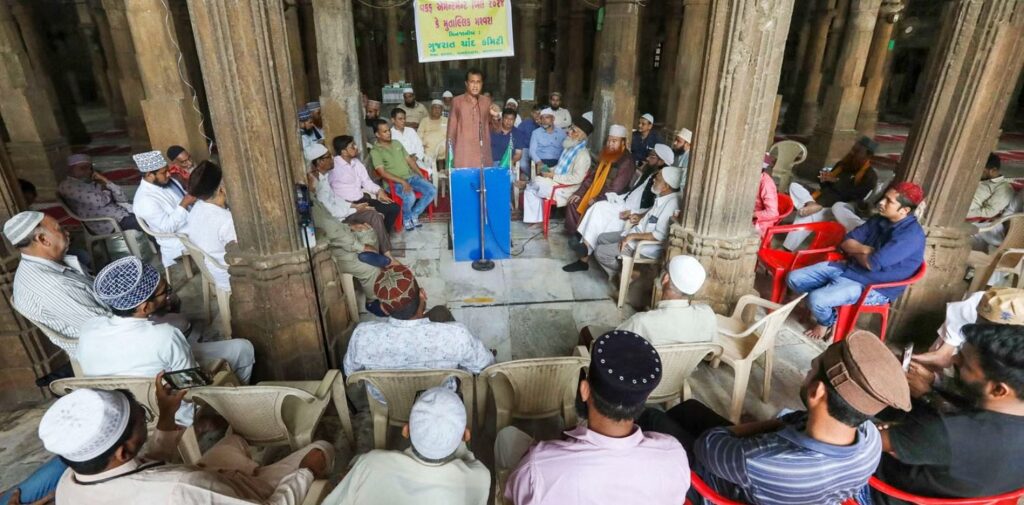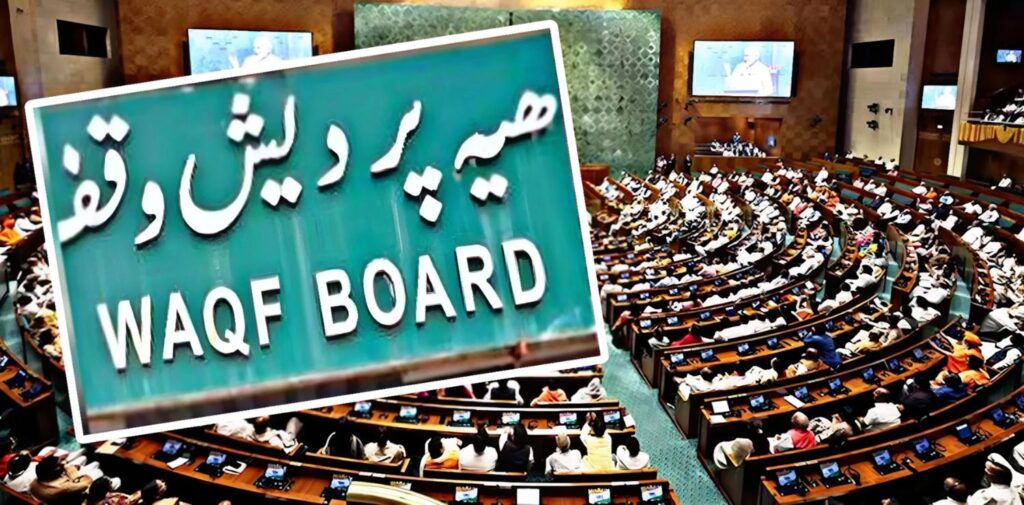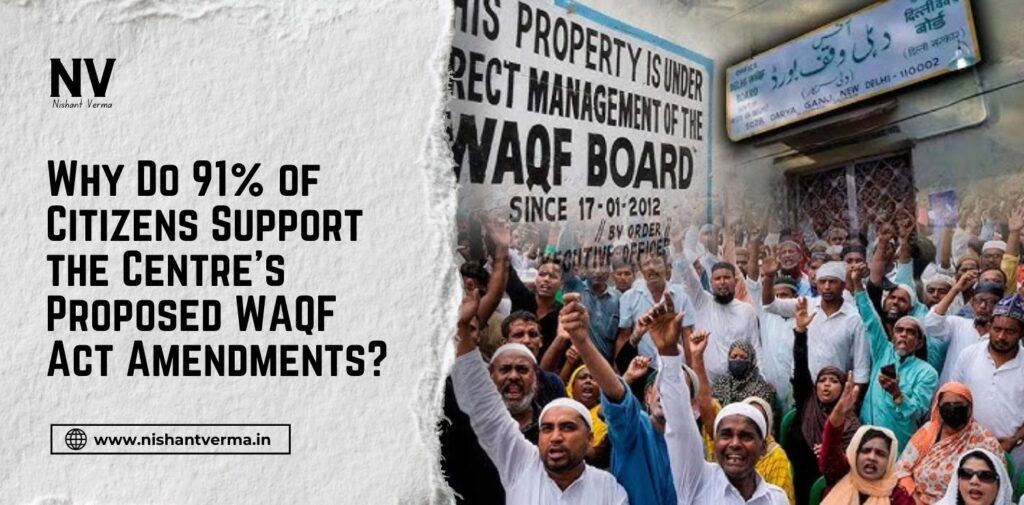The Centre’s proposed amendments to the existing WAQF Act have sparked significant discussion, and a recent survey shows that nearly 91% of people favor these changes. The survey, conducted by Local Circles and released on September 12, revealed that 9 in 10 citizens support the bill, which aims to bring more transparency to the functioning of WAQF boards across India.
In this article, we will delve into the reasons behind this overwhelming public support, examine what the amendments entail, and explore how these changes could impact WAQF boards and the general public.
What is the WAQF Act?
The WAQF Act was established to regulate and manage properties donated for religious and charitable purposes by Muslims. These properties, known as WAQF properties, are often used for purposes like building mosques, running schools, providing shelters, and more. The WAQF boards, which operate under the WAQF Act, are responsible for ensuring that these properties are utilized effectively and transparently.

However, over the years, concerns have been raised about the transparency and functioning of these boards, with allegations of mismanagement and corruption. This led to the Centre proposing amendments to the WAQF Act to make the system more accountable and transparent.
What Are the Proposed Amendments?
The Centre’s proposed amendments focus on improving the governance of WAQF boards by ensuring greater transparency and reducing the potential for mismanagement. These amendments include stricter regulations for how WAQF properties are handled, more rigorous oversight, and measures to make board operations more open to public scrutiny.
One of the key areas of reform involves the introduction of new systems for maintaining records of WAQF properties. By creating a digital and more accessible record-keeping system, the government hopes to prevent illegal sales or mismanagement of these assets. The amendments also seek to empower citizens to have more say in how these properties are utilized, ensuring that they truly serve the purpose for which they were intended.
Why Are 91% of Citizens in Support of the Amendments?
There are several reasons why the vast majority of people support these amendments. The most significant reason is the desire for more transparency and accountability within the WAQF boards. Over the years, several cases have surfaced where WAQF properties were either misused or mismanaged, leading to a loss of public trust in the system.

The public perceives that these amendments could reduce corruption, improve efficiency, and ensure that WAQF properties are used properly for charitable and religious purposes. By creating a more transparent system, the public believes that there will be less room for illegal activities or the misallocation of resources.
The Role of Technology in Bringing Transparency
One of the main features of the proposed amendments is the introduction of digital technology to manage WAQF properties. By digitizing records and making them accessible to the public, the government aims to prevent illegal encroachments, ensure proper usage of funds, and track the management of these properties in real-time.
This move towards digitization has been seen as a major step forward, especially since it will make it harder for anyone to exploit the system without being noticed. With everything being recorded digitally, there will be fewer opportunities for manipulation and a higher level of accountability.
Challenges Faced by the WAQF Boards
WAQF boards have long faced challenges in managing the large number of properties under their control. These properties, often spread across different parts of the country, require proper maintenance, usage, and funding to serve their intended purpose.
Unfortunately, in many cases, WAQF boards have struggled to handle this responsibility efficiently. Mismanagement, lack of accountability, and even corruption have been reported over the years. Some WAQF properties have been illegally sold or used for purposes that do not align with the charitable or religious intent of the original donors.
These challenges have resulted in public dissatisfaction, and the proposed amendments seek to address these issues by introducing stricter regulations and better oversight mechanisms.
Opposition to WAQF Tribunals
While there is overwhelming support for the proposed amendments, the survey also highlights that 93% of respondents are against the existence of WAQF tribunals. WAQF tribunals are special courts set up to handle disputes related to WAQF properties.
Many people believe that these tribunals have not been effective in addressing issues of mismanagement or illegal use of WAQF properties. There is a growing sentiment that these tribunals should either be reformed or dissolved altogether, as they have not lived up to their intended purpose of resolving disputes fairly and efficiently.
How Will the Amendments Impact WAQF Boards?
If passed, the proposed amendments will have a significant impact on how WAQF boards operate. The introduction of stricter regulations and more transparency will likely lead to better governance and fewer opportunities for corruption. WAQF boards will have to adhere to stricter guidelines and ensure that their operations are in line with the new amendments.

Additionally, the digitization of records will allow for greater public access to information about WAQF properties, ensuring that there is more oversight from both the government and the public. This could lead to a more efficient and accountable system overall.
The Road Ahead
While the proposed amendments to the WAQF Act have garnered widespread public support, the road ahead may still present challenges. There will likely be debates in Parliament about the specifics of the amendments, and WAQF boards may resist some of the changes due to the increased oversight they bring.
However, the overwhelming public support for these amendments shows that people are ready for change. The general public is eager to see WAQF properties managed more transparently and for the system to be more accountable to the people it serves.
Conclusion
The proposed amendments to the WAQF Act are a positive step towards improving the transparency and functioning of WAQF boards in India. With nearly 91% of citizens supporting these changes, it is clear that there is a strong desire for reform.
By introducing stricter regulations, digitizing records, and providing greater public oversight, these amendments have the potential to significantly improve how WAQF properties are managed. The government’s efforts to make the system more transparent and accountable will help restore public trust and ensure that WAQF properties are used for their intended charitable and religious purposes.
The public’s overwhelming support for these amendments reflects a broader desire for more transparency and accountability in government institutions and the management of public assets. If the amendments are passed, it could lead to a more efficient and well-governed WAQF system in India.




